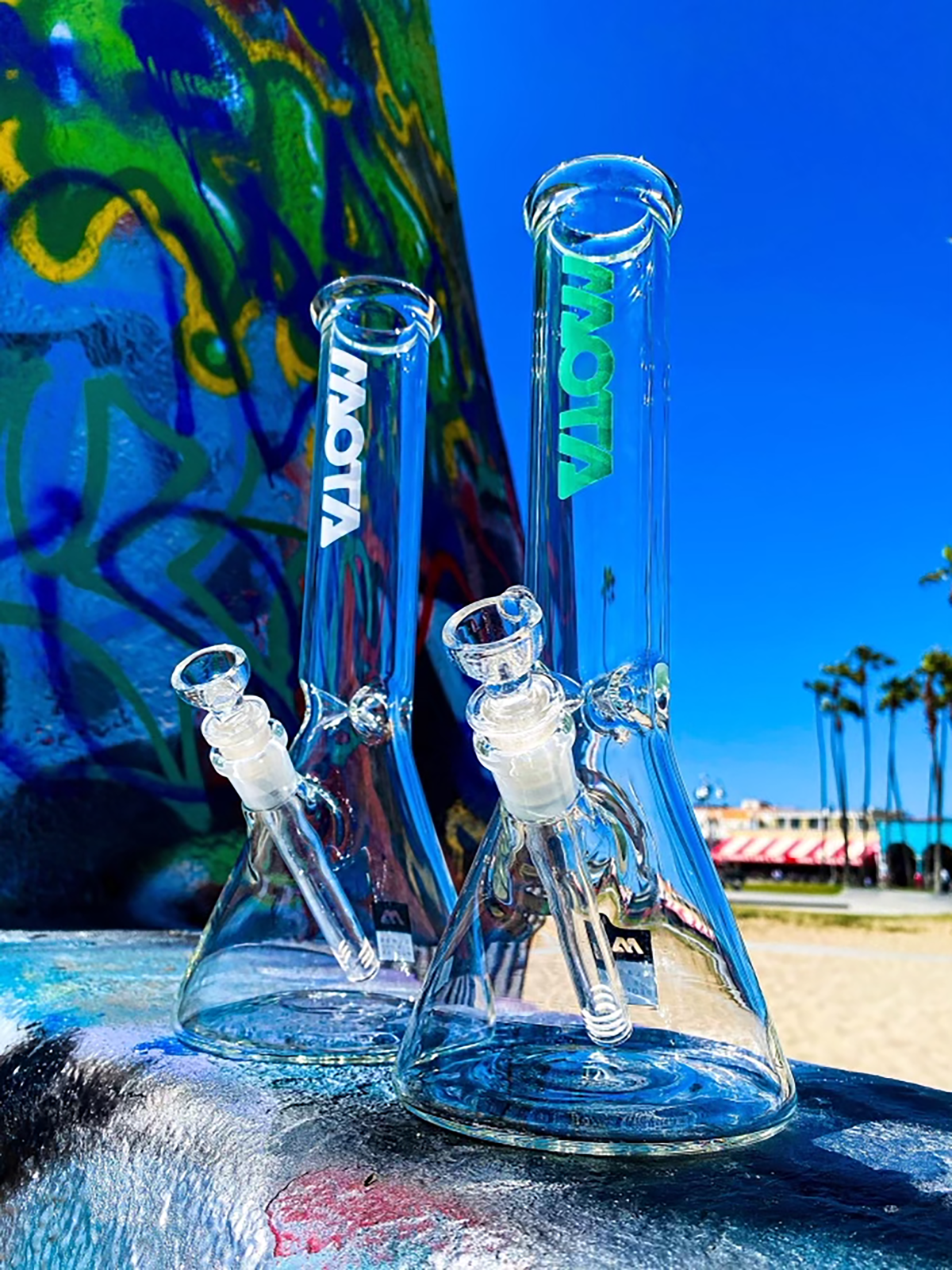Buy a bong, support a Latino artisan through this stylish L.A. brand

- Share via
I’ve had bongs aplenty over the years; tall ones, short ones, glass ones, plastic ones, fancy, utilitarian, you name it. One of the more memorable was made of solid brass. Another was crafted from a single stalk of bamboo. I never knew — or particularly cared — where they came from, and I certainly didn’t think about who made them.
That was until I spent a few hours watching glass artisan Hector Gonzales use his breath and considerable skill to transform molten glass into a sturdy beaker bong. Now, every time I see a waterpipe out in the wild, I can’t help but wonder about where it came from and who made it.
Compassionate cannabis donations are a plant medicine lifeline for military veterans and trauma survivors.
And that’s pretty much what Susie Plascencia and Bobby Lady were hoping for when the duo (partners both personally and professionally) launched L.A.-based Mota Glass in November 2020. The name, Plascencia explained, has a dual meaning. First, the word “mota,” which means “speck of dust” in Spanish, is also a slang term for weed. Here it’s also an acronym that hints at the brand’s bigger purpose. “It actually stands for Minorities for Opportunity, Transparency and Accountability,” she said.
“MOTA Glass was created to address two major things in the cannabis industry,” she said. “This mass importing of functional glass from overseas that devalues local production, [and] the continued marginalization of an overworked and underpaid minority workforce.”
Plascencia, 32, is an entrepreneur, activist and cannabis advocate who recently helped launch the Latino-community-focused cannabis label Humo and last year spearheaded the effort to make Sept. 30 National Latinas in Cannabis Day. Lady, 40, is a general contractor and U.S. Air Force veteran who served in Iraq and Afghanistan. They said they were motivated by misrepresentations they found in the current marketplace.
Rap legend Snoop Dogg knows the cost of living is rising, and he’s doing his part to keep his personal blunt roller happy.
“In a lot of cases,” Lady said, “you’ll have importers that really do nothing more than order finished pieces from overseas, decal them locally and then distribute them to shops or customers around the country. The worst culprits will put their decals on the piece here and then say, ‘Oh, it’s made in the U.S.’
“That message then gets carried across to the retailer,” he said. “The retailer happily echoes it because it drives up the possibility of a sale for them. But the reality is that the piece is not made here in the U.S., and it’s undercutting the value of glass blowers that are here in Los Angeles.”
Column One: Marijuana seller’s story of ‘badass’ Mexican sisters was a cultural misstep, Latinas say
Susie Plascencia and Savina Monet weren’t going to let La Chingona cannabis get away with cultural appropriation.
The Mota Glass business is also an opportunity, Plascencia said, to highlight a community — their community (she’s Mexican American, Lady’s the son of Honduran American parents) — that has a visibility issue in today’s cannabis industry. “A lot of the times Latinos are the backbone of this industry but are not really given that representation,” she said. “So with Mota Glass, we’re putting Latinos in the forefront and showing not only have they been in the industry but they are the backbone — and deserve that recognition.”

The company sells its assortment of straight tubes and beaker bongs primarily online (prices range from $85 for a mini beaker bong to $230 for an 18-inch-tall version with red heart accents). It currently works with a network of four local, independent Latino glass artisans, one of whom is Gonzales.
During a visit to his Gardena studio, Gonzales, who hails from Peru, explained, with Lady translating from Spanish, that glass work is in his blood. “This is a family tradition,” the 60-year-old said. “I was born surrounded by glass. My parents had a glass factory.” Pairing that lifelong familiarity with studies in mechatronics (a combination of mechanics and electronics) meant he was able to create, over the course of about a year, exactly the specialized equipment he needed to make Mota’s water pipes.
A consumption-lounge buzz is its own kind of creature. Here’s how to make the most of it.
The result is a space, about the size of a studio apartment, packed with lathes, burners, ovens and blow torches and what seems like miles of colored wire running in and out of enough circuits and switches to stock a Fry’s Electronics. Gonzales said the setup he created allows him to produce about 30 of Mota’s beaker bongs a day.
To watch him transform a raw cylinder of Schott borosilicate glass into an artisanal smoking implement is a thing of beauty from start to finish, but the most mesmerizing part is watching him gently tease the bong’s narrow base out into a beaker-like flare. With a torch in one hand, a paddle-shaped implement in the other and a thin piece of plastic tubing clenched between his teeth, he deftly coaxes the hot glass into shape, filling it with his breath.
In some ways, the 18-month-old Mota Glass business, which Lady said has sold “a few thousand” pieces since launch, is not too different from one of the molten globs of glass in Gonzales’ safety-gloved hands; it’s a work in progress still taking shape as the breath of purpose fills it.
The Green Room
The Green Room
Episodes of the second season of The Times’ video series focusing on California’s cannabis commerce and culture drop every other Wednesday at youtube.com/c/latimes.
The most recent episode of “The Green Room,” which features glass artisan Hector Gonzales making a MOTA Glass beaker bong, can be viewed above.
“The long-term goal from a manufacturing and operational standpoint is to grow into a business that employs a number of glass blowers in a traditional manner,” Lady said. “[One] that provides them with fair living wages, that gives them benefits, that gives them some of the standard expectations that one would want from any job that is their livelihood. And that’s something that we don’t really feel exists, particularly within this community.”
Getting there — which Lady hopes is one to two years away — depends on getting production ramped up to handle the increased demand that comes with expanding beyond the brand’s original direct-to-consumer business into wholesaling to bricks-and-mortar shops. (Mota Glass pieces are currently in about a dozen stores, including a Green Thumb-owned dispensary in Mundelein, Ill., and a headshop called Taimado in Tokyo.)
Low start-up costs, less regulation and a central location have local cannabis brands looking east.
When Mota‘s in-house, L.A.-based glassworks does become a reality — whatever the time frame — Lady said the scale of the production facility will allow them to make not only Mota Glass bongs but also private-label pieces for other bong brands looking to capitalize on the “made in the U.S.A.” cachet.
Which, given what spurred the creation of the company in the first place, is a delicious bit of irony.
More to Read
Sign up for The Wild
We’ll help you find the best places to hike, bike and run, as well as the perfect silent spots for meditation and yoga.
You may occasionally receive promotional content from the Los Angeles Times.
















